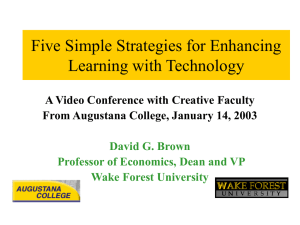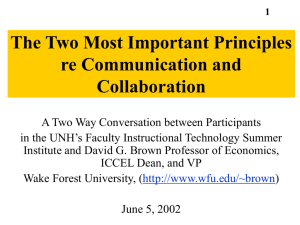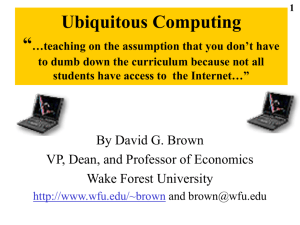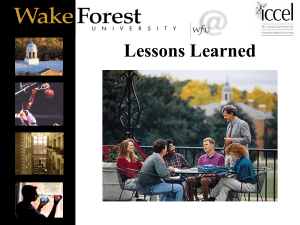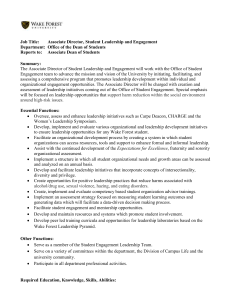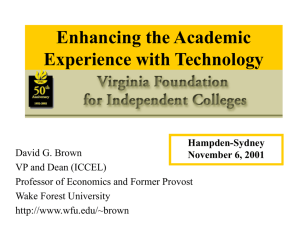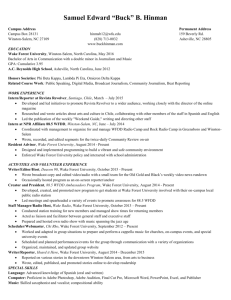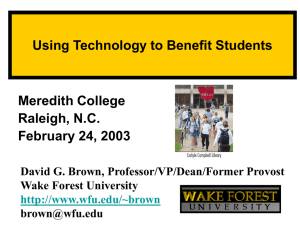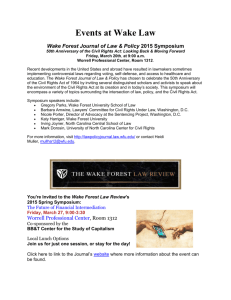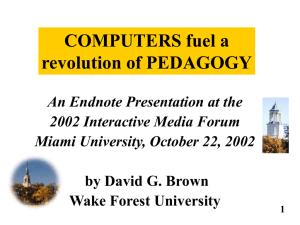PowerPoint - Wake Forest Student, Faculty and Staff Web Pages
advertisement
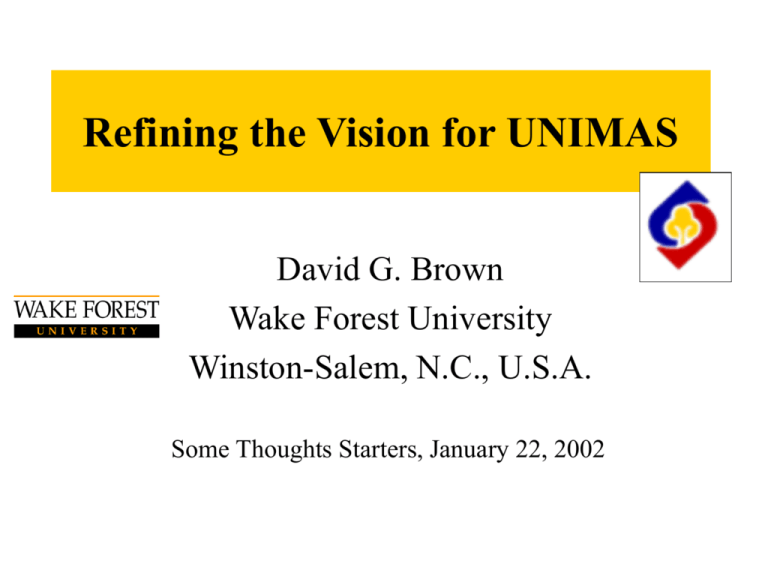
Refining the Vision for UNIMAS David G. Brown Wake Forest University Winston-Salem, N.C., U.S.A. Some Thoughts Starters, January 22, 2002 TWO BASIC THEMES • FOCUS on key concepts! • Stress LEARNING, not technology ICCEL -- Wake Forest University, 2002 OUTLINE OF REMARKS • • • • • Define Quality Teaching-Learning Cite Proof that Technology enhances quality Explain the Wake Forest Strategy Demonstrate my personal teaching Discuss Why Wake Forest Has Computerized, Standardized, Etc. • Suggest Implications for UNIMAS ICCEL -- Wake Forest University, 2002 • Discussion •Globalization •Diversity •Progressive Culture •Quality Education What do high quality professors do? (more than low quality professors) Write down 3 or 4 phrases! Exchange answers with a neighbor! (this is active learning) What do high quality professors do? [American Opinion---List #1] 1. Become competent in their field & project that competence to students 2. Trust that their students are capable & project that trust to students 3. Plan What do high quality professors do? List #2. Teaching Strategies Interactive Learning, 1999 Teaching with Technology, 2000 1. 2. 3. 4. 5. Interact frequently with students Promote student-to-student collaboration Stimulate controversy and debate Use adjunct professors Provide different strokes for different folks These five strategies are the FUTURE of teaching & learning! What do high quality professors do? List #3. Good Practices-Effective Teaching [Chickering-Gamson, 1967] 1. 2. 3. 4. 5. 6. 7. Good practice encourages contact between students and faculty. Good practice encourages cooperation among students. Good practice encourages active learning. Good practice gives prompt feedback. Good practice emphasizes time on task. Good practice communicates high expectations. Good practice respects diverse talents and ways of learning. If computers facilitate these seven good practices---then computers can result in higher quality professors and learning. Research Results • University of Central Florida--Hybrid courses win! (the 80-20 rule) • 18,844 students at 71 American Universities--More “good practices” for wired students! • 150 professors at 50 Research Universities--Interaction, Collaboration, Debate, Custom, Adjuncts! • Virginia Polytechnic University--Calculus failure rate cut by 44%! • Seton Hall University--More self-exploration, contact, feedback, learning! Future of Teaching & Learning • • • • • • Personal. Customized. Interactive. Student-Centered Curriculum Teams of Professionals to Support Learning “Houses” instead of Disciplines Hybrid Courses (80-20 and 20-80) Loose-leaf Collections of Course Components, instead of Textbooks THE WAKE FOREST PLAN IBM A21m, Pentium III, 700 Mhz, 20GB, 14”ActMatrix, 196MB, Re-writable CD 56k modem, 8MB Video Ram, 10/100 Ethernet, Floppy, USB&Serial&Parellel&Infrared Ports • • • • • • • • • • IBM Laptops for all Printers for all New Every 2 Years Own @ Graduation 31.000 Connections Standard Software 99% E-Mail Start 1995, 4 Year Phase In +15% Tuition for 37 Items +40 Faculty and 30 Staff ICCEL -- Wake Forest University, 2002 CONCEPTS BEHIND PLAN • • • • Students First 2 Layers: Threshold + Rapid Change Communicate/Access (Not Present/Analyze) • Standardization • Academic Freedom • Nomadic Learners ICCEL -- Wake Forest University, 2001 CONCEPTS BEHIND PLAN • • • • • • • Dominant Use After College Empower Existing Units Eager Faculty Students Change Agent Exposure, Not Mandate Partnership Marketable Difference ICCEL -- Wake Forest University, 2001 Consequences for Wake Forest • • • • +SAT Scores & Class Ranks +Retention & Grad Rates +Satisfaction & Learning +Faculty Recruitment ICCEL -- Wake Forest University, 2001 Computers Enhance My Teaching and/or Learning Via-Presentations Better--20% More Opportunities to Practice & Analyze--35% More Access to Source Materials via Internet--43% More Communication with Faculty Colleagues, Classmates, and Between Faculty and Students--87% ICCEL -- Wake Forest University, 2002 Computers allow people---• to belong to more communities • to be more actively engaged in each community • with more people • over more miles • for more months and years • TO BE MORE COLLABORATIVE ICCEL -- Wake Forest University, 2002 FIRST YEAR SEMINAR The Economists’ Way of Thinking: • To understand a liberal arts education as an opportunity to study with professors who think by their own set of concepts • To learn how to apply economic concepts • To learn how to work collaboratively • To learn computer skills • To improve writing and speaking Students = 15 All Freshmen Required Course Communication-Interaction •1247 emails •One Minute Quiz •Muddiest Point Collaboration-Teams •2 Students Submit 1 Answer •Edit Rough Draft Papers •Name 3 Most Helpful Students WHY COMPUTERS? …the institutional answer • • • • • • Communication! Level Playing Field After College Use Faculty/Students Demand Them Customized/Personalized Digitized Scholarship WHY UBIQUITOUS? • Mentality shifts-- like from public phone to personal phone. • Teaching Assumptions shift-- like from readings are on reserve to everyone owns a copy of his/her own. • Timelines shift-- like from “our class meets MWF” to “we see each other all the time and MWF we meet together” • Students’ sense of access shifts-- like from “I can get that book in the library” to “I have that book in my library.” • Relationships shift-- like from a family living in many different states to all family members living in the same tow WHY STANDARD? • • • • • • Communication Utility! (George Gilder) 99% Reliability A Must in Classroom Buddies Share Hardware & Knowledge Better, Cheaper Support Systems Marketing Advantages Faculty “Trusts” Equality of Access WHEN WAKE FOREST STARTED OVER WITH A NEW TECHNOLOGY STRATEGY, WE SOUGHT OUT A PARTNERSHIP WHICH--1. 2. 3. 4. 5. 6. 7. 8. 9. Attracted quality students, faculty Caught the attention of academia Accepted total responsibility (general contractor) Responded to our customized needs Promised high priority delivery of service Provided insurance for unforeseen challenges Enabled many options Would connect us with their worldwide partners Was eager to partner with us Implications for UNIMAS • • • • • • • • • Provide Internet connectivity to every professor Support electronic communities & publication Teach on the assumption of student access Emphasize the simple uses of technology Stress the communication function Standardize whenever possible Collaborate with other international universities Provide e-mail address for every student Select a comprehensive partner for long term David G. Brown Wake Forest University Winston-Salem, N.C. 27109 336-758-4878 email: brown@wfu.edu http//:www.wfu.edu/~brown fax: 336-758-4875 ICCEL -- Wake Forest University, 2002
